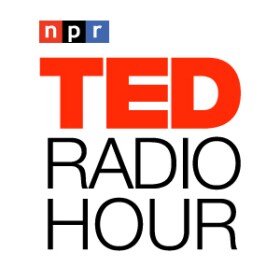
An idea is the one gift that you can hang onto even after you've given it away. Welcome to TED Radio Hour hosted by Guy Raz – a journey through fascinating ideas: astonishing inventions, fresh approaches to old problems, new ways to think and create.
Based on Talks given by riveting speakers on the world-renowned TED stage, each show is centered on a common theme – such as the source of happiness, crowd-sourcing innovation, power shifts, or inexplicable connections – and injects soundscapes and conversations that bring these ideas to life.
TED Radio Hour is a co-production of NPR and TED.
About TED
TED is a nonprofit organization devoted to Ideas Worth Spreading. Started as a four-day conference in California 25 years ago, TED has grown into a global platform for identifying and spreading those world-changing ideas. The annual TED Conference and TEDGlobal Conferences invite the world's leading thinkers and doers to speak for up to 18 minutes. Their talks are then made available, free, at TED.com and through TED distribution partners. Follow TED on Twitter or on Facebook.
About Guy Raz
Guy Raz is the host of TED Radio Hour, a co-production of NPR and TED that tackles astonishing inventions, fresh approaches to old problems and new ways to think and create. Each radio show is based on talks given by riveting speakers on the renowned TED stage, bound together by a common theme such as the thrill of space exploration, going to extremes, the source of happiness or 'when rights goes wrong' in our justice system.
Previously, Raz was weekend host of NPR News' signature afternoon newsmagazine All Things Considered. Raz was named host of that program in July 2009. During his tenure, Raz transformed the sound and format of the program, introducing the now-signature "cover story" and creating the popular "Three-Minute Fiction" writing contest.
HD 1: Sun @ 3PM-4PM
HD 2: Sat @ 3PM-4PM
-
AI has sparked big questions around safety and ethics. OpenAI CEO Sam Altman shares his vision for AI's future and why he thinks the rewards outweigh the risks, live onstage with TED's Chris Anderson.
-
While big tech pours billions into the AGI race, China leans into open source models. NPR's John Ruwitch explains why this approach works in China's favor and what it means for the rest of the world.
-
Kids immediately find joy and bliss in a playground. Photographer Stefen Chow wants adults to reconnect to that same feeling.
-
As host of the On Being radio show, Krista Tippett asked guests countless metaphysical questions. But this new year, she recommends tossing the resolutions and turning the big questions on yourself.
-
A new AI tool called Inquire is trained on millions of wildlife photos from citizen scientists worldwide. Researcher Sara Beery hopes it will supercharge ecosystem conservation.
-
Computational linguist Jeff Reed figured out how to eavesdrop on wolves in the wild. But he needed help from AI to separate the signal from the noise, and start to decode what each howl means.
-
Why do hard-working people sometimes lose their motivation? Behavioral scientist Ayelet Fishbach explains where motivation comes from, why it wanes and how to recapture it.
-
Your life could unfold in infinitely different ways, but you can only choose one path. It took author Oliver Burkeman years to accept his mortal limitations and embrace a life he's actively choosing.
-
Living by the clock is a relatively new concept. It works for some, but others see time as a string of events. Psychologist Anne-Laure Sellier explains what we lose when we track our days so closely.
-
Applying for a job? You might be interviewing with an algorithm before a person. Journalist Hilke Schellmann shares how AI is reshaping hiring—and what job seekers can do to make it past the bots.











